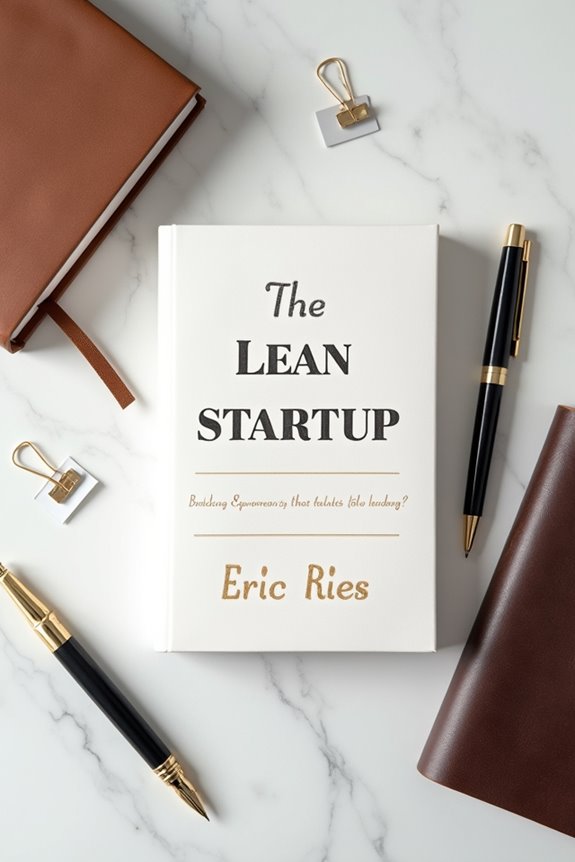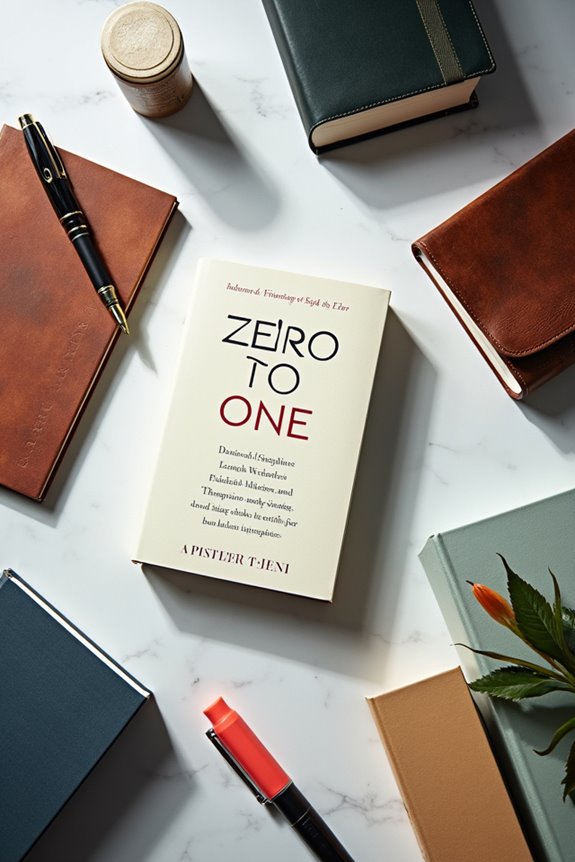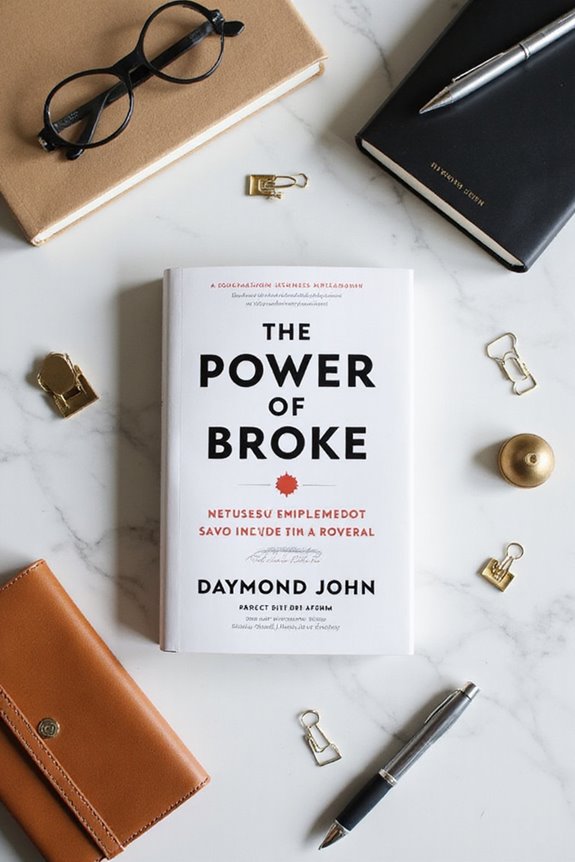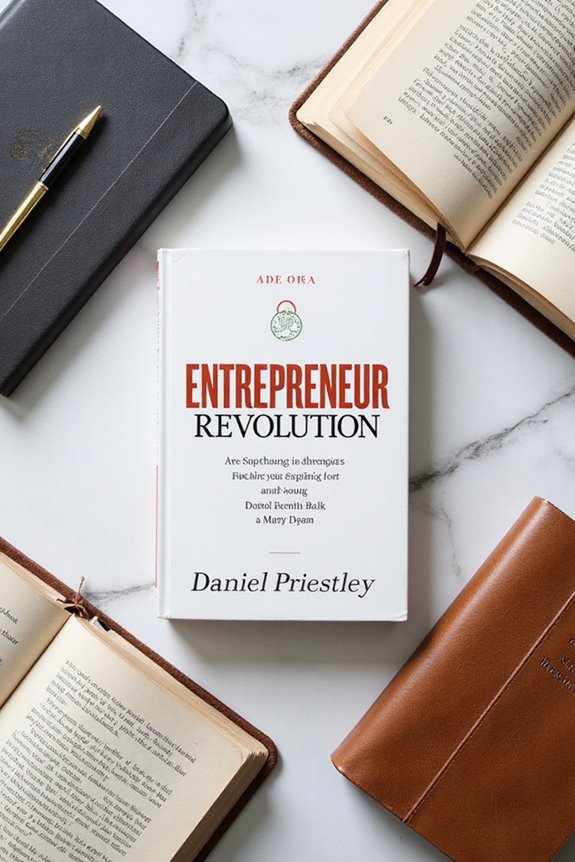If you’re diving into entrepreneurship, a few print books should be on your radar. “The Lean Startup” by Eric Ries helps you test ideas quickly and learn from feedback. Check out “Zero to One” by Peter Thiel for insights on creating new markets. “The Power of Broke” by Daymond John shows how limited resources can spark creativity. And don’t miss “Good to Great” by Jim Collins, which covers key leadership principles. Stay with us for more recommendations.
Key Takeaways
- “The Lean Startup” by Eric Ries offers methodology for validated learning and customer feedback to develop successful products.
- “Zero to One” by Peter Thiel emphasizes innovation strategies for creating and dominating new markets through contrarian thinking.
- “The Power of Broke” by Daymond John highlights financial resilience and using limited resources creatively to overcome adversity.
- “Entrepreneur Revolution” by Daniel Priestley encourages adopting an entrepreneurial mindset and developing a personal brand to attract premium clients.
- “Good to Great” by Jim Collins outlines essential leadership principles to transform businesses and emphasizes the importance of assembling strong teams.
The Lean Startup by Eric Ries

If you’ve ever thought about starting a business, you might know how overwhelming it can seem. That’s where “The Lean Startup” by Eric Ries comes in. This book introduces Lean Principles that can transform our approach to entrepreneurship. It emphasizes a Startup Methodology that thrives on a Feedback Loop of valid ideas. By focusing on Validated Learning through real customer interaction, we’re encouraged to release minimum viable products quickly. With Innovation Accounting, we can measure what matters, tracking progress based on customer feedback and actionable metrics, rather than just the usual numbers. Adopting these practices cultivates an Agile Development mindset and fosters an Experimentation Culture, allowing us to pivot or persevere, ensuring we create products that genuinely meet market needs.
Zero to One by Peter Thiel

Innovation stands at the heart of entrepreneurship, and that’s exactly what Peter Thiel explores in “Zero to One.” This book teaches us that true innovation doesn’t just add to what’s already out there; it creates something entirely new, moving from zero to one instead of merely making one thing better. Thiel emphasizes the importance of innovation strategies that enable startups to dominate unique markets, rather than merely competing on price. He encourages us to embrace contrarian thinking by identifying truths few agree with, especially about technology’s pivotal role in our future. By doing so, we can build businesses that not only aim for profits but also change the landscape of our industries. So, let’s think beyond the ordinary and create something remarkable!
The Power of Broke by Daymond John

Building on the idea that innovation can spark from limited resources, let’s consider “The Power of Broke” by Daymond John. This book is packed with motivational stories that showcase financial resilience and the entrepreneurial mindset. John illustrates how being broke can actually push us to find creative solutions and embrace resourceful strategies. He shares his own journey, reminding us that overcoming adversity isn’t just possible; it’s a path to authentic leadership. When we face innovation challenges, using our limited resources can lead to unexpected breakthroughs. It’s all about setting realistic goals, networking, and finding mentors who inspire us. So, let’s leverage our circumstances to fuel our passion, embrace our creativity, and transform our obstacles into opportunities for success!
Entrepreneur Revolution by Daniel Priestley

The “Entrepreneur Revolution” by Daniel Priestley paints a vivid picture of today’s shifting landscape where traditional job security is fading fast, making space for entrepreneurial ventures. This book emphasizes the importance of developing an entrepreneurial mindset, encouraging us to see challenges as opportunities. Priestley highlights the power of owning intellectual property, such as books and courses, as assets we can leverage. He introduces the “Key Person of Influence” blueprint, which teaches us how to attract premium clients and scale our businesses. With practical advice and relatable case studies, we learn to cultivate a personal brand, design our lifestyles for creativity, and embrace change. Let’s take these insights and kickstart our journey toward successful entrepreneurship!
Burn Rate by Andy Dunn

Entrepreneurship can be a wild ride, and if we look closely at Andy Dunn’s “Burn Rate,” we get a front-row seat to that emotional rollercoaster. This memoir offers a candid look at Dunn’s entrepreneurial struggles alongside his battle with mental health issues, particularly bipolar disorder. He takes us through the highs of co-founding Bonobos and the inevitable lows that followed, all while juggling creativity and performance challenges.
For those of us aspiring to become entrepreneurs, Dunn emphasizes the importance of self-care. We should recognize our mental health warning signs and lean on a supportive network. Let’s remember that success doesn’t come without its costs, and openness about our struggles can help make the entrepreneurial journey a little less intimidating.
Build the Damn Thing by Kathryn Finney
Steering through the world of startups can feel a bit like trying to complete a video game on the hardest level, especially for those of us who don’t fit the traditional mold of a founder. In “Build the Damn Thing,” Kathryn Finney offers a roadmap specifically for us, highlighting the importance of an entrepreneurial mindset while shedding light on systemic barriers we face. Her personal experiences maneuvering funding as a Black woman provide pragmatic strategies on forming business plans, securing investors, and building teams. Finney emphasizes resilience and reframes failure as a stepping stone, not an end. So, let’s take her advice, disrupt the status quo, and build our paths to success, leveraging our unique networks for support.
Good to Great by Jim Collins
Success in business doesn’t just happen overnight; it’s a journey, often marked by ups and downs. In “Good to Great,” Jim Collins takes us through essential leadership principles that can transform any venture. One key idea is Level 5 Leadership, which combines humility with determination—great leaders put their company’s success before personal glory. Strategic hiring is another vital aspect; Collins emphasizes getting the right people on the bus before finalizing the route. We should prioritize assembling a strong team, we’re not just looking for warm bodies. Collins also encourages us to confront brutal facts—this honesty helps us make better decisions. Moreover, understanding persuasive communication skills is essential for effectively conveying our vision and rallying others to our cause. Remember, greatness is achieved through consistent effort, so let’s embrace the journey and take actionable steps forward!
The E-Myth Revisited by Michael E. Gerber
Gerber outlines three key personalities: The Entrepreneur, The Manager, and The Technician. Balancing these roles helps us create scalable processes. By shifting our focus from daily tasks to strategic development, we can build businesses that thrive without our constant involvement, setting ourselves up for long-term success.
Start With Why by Simon Sinek
When we think about building a successful business, we often focus on the mechanics of operations, just like Michael E. Gerber teaches. However, Simon Sinek’s “Start With Why” shows us the importance of purpose-driven leadership. By identifying our “Why,” we inspire others and create lasting customer loyalty. Instead of manipulating with discounts, we can engage customers who resonate with our vision. For example, Apple stands out not just for its products, but for a strong belief in innovation. Sinek argues that a clear purpose fosters a culture that not only attracts customers but keeps them loyal for the long haul. So, let’s dig deep into our “Why” and watch our businesses thrive!
Frequently Asked Questions
How Can I Apply These Methodologies to My Specific Industry?
In adapting methodologies, we must remember that “a stitch in time saves nine.” By conducting industry analysis, we can tailor our approach and methodology adaptation to effectively tackle unique challenges and seize opportunities in our specific sector.
What Are the Common Pitfalls to Avoid When Starting a Business?
When starting a business, we shouldn’t overlook market research and financial management. Identifying our target audience and ensuring effective budgeting can help us avoid common pitfalls and increase our chances of success.
How Do I Choose the Right Book for My Entrepreneurial Stage?
When we consider choosing the right book for our entrepreneurial stage, it’s like Sarah learning about market research before launching her bakery. We need tailored book recommendations to cultivate our entrepreneurial mindset and support our growth.
Can These Books Help With Personal Development Beyond Business?
Absolutely, these books guide us in mindset transformation and emotional intelligence, enhancing our personal lives too. They help foster resilience, improve relationships, and encourage self-awareness, proving invaluable beyond just our business journeys.
What Resources Complement These Books for Practical Learning?
Like a treasure map guiding us, online courses and mentorship programs illuminate our entrepreneurial journey. Together, we’ll blend book wisdom with hands-on experience, crafting strategies and connections that spark growth and ignite success in our ventures.





